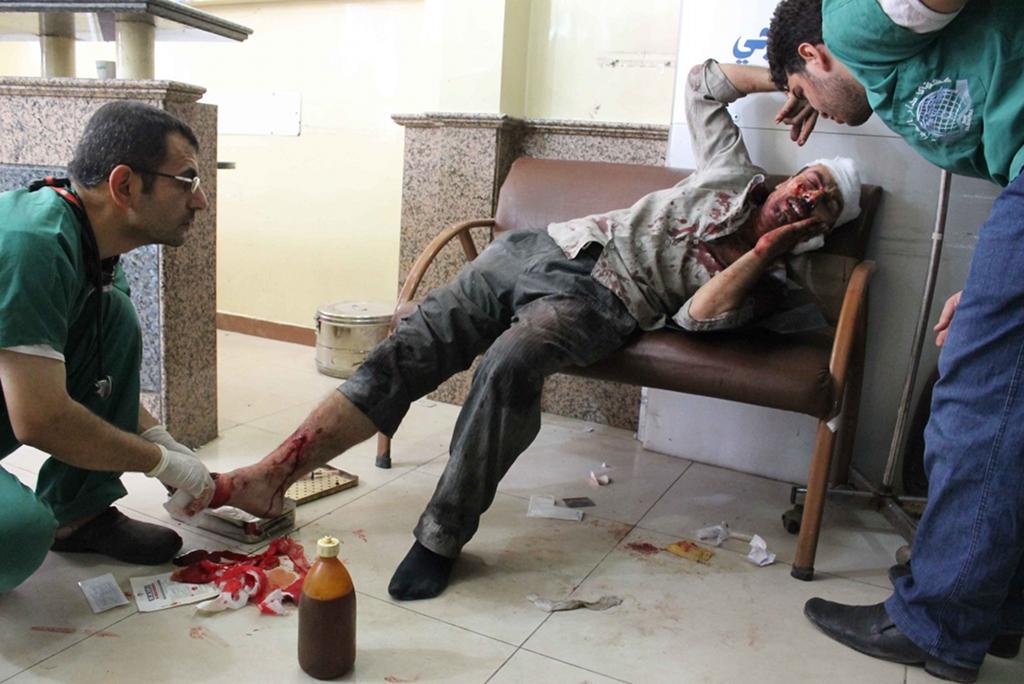Paralyzed by a Syrian shell, Maram, 4, waits for the world’s attention
A wounded Syrian man receives medical treatment at a hospital in the northern Syrian city of Aleppo on Sep. 20, 2012. Doctors in the region risk imprisonment, torture, and death at the hands of Assad’s forces if they continue to treat injured civilians and rebels.
BOSTON — I am struggling to understand the realities of what is happening to the people of Syria, the innocent mothers and children, not unlike my own family. I am just back from the Syrian border, where I met a girl named Maram, just 4 years old. A victim of Bashar al-Assad's campaign to break the insurgency, she is lying in a rehabilitation clinic with a broken and paralyzed body.
Maram's village, like hundreds of others, was intentionally bombed by the regime, killing and mutilating thousands of civilians, including women and children. The terror Maram's mother described when the bomb hit their house on August 23 is unimaginable to most of us. The dust was blinding, and she heard crying and screaming, but her only thought was, "Where are my children?" She saw blood flow from her father-in-law's chest as he lay dying. She was told that Maram had been injured and taken to a hospital.
Months later, Maram now lies in a rehabilitation clinic just across the Syrian border. Three of her vertebrae have been shattered. Even after emergency surgery, the path of bright shrapnel is visible on her CT scan. She is paralyzed, unable to control her bowels or bladder.
Her mother and 3-year-old brother are living with her in the small clinic room. Maram scoots across the carpet, using her hands. She was delighted with the Mickey Mouse craft set that I brought her from Boston, and tore into the stickers, crayons, coloring book, and stamps.
I was dismayed to see the curvature and deformity that have already developed in Maram's spine, and surprised but delighted that she has some tingling sensation in both legs and could even push a little with her left leg.
An orthopedic spine surgeon whom I consulted said Maram does have potential for improvement, but that she requires prolonged rehabilitation in a spinal cord injury rehabilitation center.
Such medical expertise is not within her reach. Proper treatment could make the difference between Maram's leading a painful immobile existence, potentially shortened by complications of the injury, or reaching her potential as a productive member of society. The list of innocent victims like Maram is endless.
Other Syrian casualties of the Assad regime's crimes require medical treatment not available to them because medical facilities have been destroyed and hundreds of thousands of civilians have been displaced from their homes and cities. The regime is just as responsible for killing those now left without life-saving measures like cancer treatment or renal dialysis as if snipers had shot them.
Torture in Syria is occurring on a massive scale, and the world needs to know the horrific details. I examined a young man who was detained and tortured. When he asked for mercy and told his captors about an impending engagement, he was tortured in a way intended to inflict unspeakable pain and humiliation, and to destroy his future: A metal ring less than half an inch in diameter was placed around his genitalia, where it remained for a month. This caused such severe swelling that the ring could not be removed. He suffered indescribable pain, and is left with permanent disfiguring and damaging injuries. Such stories are horrific, and the medical evidence irrefutable.
This story has heroes, but none of them are world leaders. They are the doctors whose hospitals have been destroyed and families displaced, some of whom have even been arrested and tortured or killed simply for treating injured patients.
These doctors have chosen to live in dangerous conditions, and continue to treat injured Syrians under desperate circumstances. They are committed to relieving human suffering, even at great risk to themselves. These Syrian doctors and the patients I evaluated are some of the most inspiring people I have ever met.
At a minimum, Americans should urge the Obama administration to press all sides in the Syrian conflict to make a commitment not to target medical personnel, block access to doctors and hospitals, or attack medical facilities, as Australia proposed recently in the UN. The humanitarian situation is urgent and escalating daily; by ignoring it, we are forsaking our own humanity.
While I listened to many horrific stories and offered each person my compassion and even my tears, I could not answer their queries as to why they have been forgotten by the world. But I promised I would bring their voices home to the United States.
I also promised little Maram that I would try to locate a pediatric spinal cord injury rehabilitation center that will offer to provide her care. As a physician and human being, I have the obligation to help the people I met, one by one.
Inshallah.
Dr. Sondra Crosby was on an assignment on the Syrian border as a volunteer with Physicians for Human Rights. She is an Associate Professor of Medicine and Public Health at Boston University School of Medicine and her clinical practice focuses on care of asylum seekers, asylees and refugees.
Every day, reporters and producers at The World are hard at work bringing you human-centered news from across the globe. But we can’t do it without you. We need your support to ensure we can continue this work for another year.
Make a gift today, and you’ll help us unlock a matching gift of $67,000!
